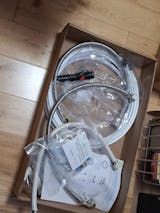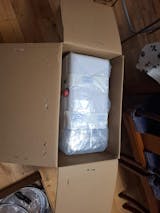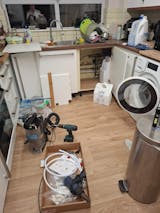What is the Water Hardness in my Area?
Water Hardness by Postcode
Have you been searching "what is the water hardness in my area?" - use our water hardness checker to find out your home's water hardness by postcode.
If your results show a level of 100ppm or more on the water hardness scale, you could benefit from a water softener.
Please write the postcode in the format xx xxx | xxx xxxx.
has
Soft Water
Moderately Soft Water
Moderately Hard Water
Hard Water
Very Hard Water
ppm
Soft Water
Moderately Soft Water
Moderately Hard Water
Hard Water
Very Hard Water
Your home has soft water. Soft water is water which has relatively low concentration of calcium and magnesium. Your water should lather easily with soap.
Your home has moderately soft water. Soft water is water which has relatively low concentration of calcium and magnesium. Your water should lather easily with soap.
Your home has moderately hard water. A level over 100ppm means your home could benefit from a water softener. Moderately hard water has excess calcium and magnesium ions present. Over time this can lead to limescale build up. You may notice white spots on your surfaces and glassware.
Your home has hard water. A ppm level over 100ppm means your home would benefit from a water softener. Hard water contains high levels of calcium and magnesium. Hard water causes limescale build-up which damages your home and only gets worse over time.
Your home has very hard water. A ppm level over 180ppm means your home would benefit from a water softener. Very hard water contains very high levels of calcium and magnesium, which results in severe limescale damage which gets worse over time.
AL10
AL8
AL9
B1
B10
B11
B12
B13
B14
B14
B15
B15
B16
B17
B18
B18
B18
B19
B2
B20
B20
B21
B23
B24
B25
B26
B27
B28
B29
B3
B30
B31
B32
B33
B34
B35
B36
B37
B38
B4
B42
B43
B43
B44
B44
B45
B45
B46
B47
B48
B49
B5
B50
B6
B60
B61
B62
B63
B64
B65
B66
B67
B68
B69
B7
B70
B71
B72
B73
B74
B75
B76
B77
B78
B79
B8
B80
B9
B90
B91
B92
B93
B94
B95
B96
B97
B98
BA1
BA10
BA11
BA12
BA13
BA14
BA15
BA16
BA2
BA20
BA21
BA22
BA3
BA4
BA5
BA6
BA7
BA8
BA9
BH1
BH10
BH11
BH12
BH13
BH14
BH15
BH16
BH17
BH18
BH19
BH2
BH20
BH21
BH22
BH23
BH24
BH25
BH3
BH31
BH4
BH5
BH6
BH7
BH8
BH9
BN1
BN10
BN11
BN12
BN13
BN14
BN15
BN16
BN17
BN18
BN2
BN20
BN21
BN22
BN23
BN24
BN25
BN26
BN27
BN3
BN41
BN42
BN5
BN6
BN7
BN8
BN9
BR1
BR2
BR3
BR4
BR5
BR6
BR7
BR8
BS1
BS10
BS11
BS12
BS13
BS16
BS2
BS20
BS21
BS22
BS23
BS24
BS25
BS26
BS27
BS28
BS29
BS3
BS30
BS31
BS32
BS34
BS35
BS36
BS37
BS39
BS4
BS40
BS41
BS48
BS49
BS5
BS6
BS7
BS8
BS9
CB1
CB10
CB11
CB2
CB21
CB22
CB23
CB24
CB25
CB3
CB4
CB5
CB6
CB7
CB8
CB9
CM1
CM11
CM12
CM13
CM14
CM15
CM16
CM17
CM18
CM19
CM2
CM20
CM21
CM22
CM23
CM24
CM3
CM4
CM5
CM6
CM7
CM77
CM77
CM8
CM9
CMO
CO1
CO10
CO11
CO12
CO13
CO14
CO15
CO16
CO2
CO3
CO4
CO5
CO6
CO7
CO8
CO9
CR2
CR3
CR4
CR5
CR6
CR7
CR8
CRO
CT1
CT10
CT11
CT12
CT13
CT14
CT15
CT16
CT17
CT18
CT19
CT2
CT20
CT21
CT3
CT4
CT5
CT6
CT7
CT8
CT9
CV1
CV10
CV11
CV12
CV13
CV2
CV21
CV22
CV23
CV3
CV31
CV32
CV33
CV34
CV35
CV36
CV37
CV4
CV47
CV5
CV6
CV7
CV8
CV9
DA1
DA10
DA11
DA12
DA13
DA14
DA15
DA16
DA17
DA18
DA2
DA3
DA4
DA5
DA6
DA7
DA8
DA9
DE1
DE11
DE12
DE13
DE14
DE15
DE21
DE22
DE23
DE24
DE3
DE4
DE45
DE5
DE55
DE56
DE6
DE65
DE7
DE72
DE73
DE74
DE75
DN1
DN10
DN11
DN11
DN12
DN14
DN15
DN16
DN17
DN17
DN18
DN19
DN2
DN20
DN21
DN22
DN3
DN31
DN32
DN33
DN34
DN35
DN36
DN37
DN38
DN39
DN39
DN4
DN40
DN41
DN5
DN6
DN7
DN8
DN9
DT1
DT10
DT11
DT11
DT2
DT3
DT4
DT5
DT6
DT7
DT8
DT9
DY1
DY10
DY10
DY11
DY12
DY13
DY14
DY2
DY3
DY4
DY5
DY6
DY7
DY8
DY9
E1
E1W
E10
E11
E12
E13
E14
E15
E16
E17
E18
E2
E20
E3
E4
E5
E6
E7
E8
E9
EC1A
EC1M
EC1N
EC1R
EC1V
EC1Y
EC2A
EC2M
EC2N
EC2R
EC2V
EC2Y
EC3A
EC3A
EC3A
EC3M
EC3N
EC3R
EC3V
EC4A
EC4M
EC4N
EC4R
EC4V
EC4Y
EN1
EN10
EN11
EN2
EN3
EN4
EN5
EN6
EN7
EN8
EN9
GL1
GL10
GL11
GL12
GL13
GL14
GL15
GL16
GL17
GL18
GL19
GL2
GL20
GL3
GL4
GL5
GL50
GL51
GL52
GL53
GL54
GL55
GL56
GL6
GL7
GL8
GL9
GU1
GU10
GU11
GU12
GU14
GU15
GU16
GU17
GU18
GU19
GU2
GU20
GU21
GU22
GU23
GU24
GU25
GU26
GU27
GU28
GU29
GU3
GU30
GU31
GU32
GU33
GU34
GU35
GU4
GU46
GU47
GU5
GU51
GU52
GU6
GU7
GU8
GU9
HA0
HA1
HA2
HA3
HA4
HA5
HA6
HA7
HA8
HA9
AL5
HP1
HP10
HP11
HP12
HP13
HP14
HP15
HP16
HP17
HP18
HP19
HP2
HP20
HP21
HP22
HP23
HP27
HP3
HP4
HP5
HP6
HP7
HP8
HP9
HR1
HR2
HR3
HR4
HR5
HR6
HR7
HR8
HR9
HU1
HU10
HU11
HU12
HU13
HU14
HU15
HU16
HU17
HU18
HU19
HU2
HU20
HU3
HU4
HU5
HU6
HU7
HU8
HU9
IG1
IG10
IG11
IG2
IG3
IG4
IG5
IG6
IG7
IG8
IG9
IP1
IP10
IP11
IP12
IP13
IP14
IP15
IP16
IP17
IP18
IP19
IP2
IP20
IP21
IP22
IP23
IP24
IP25
IP26
IP27
IP28
IP29
IP3
IP30
IP31
IP32
IP33
IP4
IP5
IP6
IP7
IP8
IP9
KT24
KT1
KT10
KT11
KT12
KT13
KT14
KT15
KT16
KT17
KT18
KT19
KT2
KT20
KT21
KT22
KT23
KT3
KT4
KT5
KT6
KT7
KT8
KT9
LE1
LE10
LE11
LE12
LE13
LE14
LE15
LE16
LE17
LE18
LE19
LE2
LE3
LE4
LE5
LE6
LE65
LE67
LE7
LE8
LE9
LN1
LN10
LN11
LN12
LN13
LN2
LN3
LN4
LN5
LN6
LN7
LN8
LN9
LU1
LU2
LU3
LU4
LU5
LU6
LU7
ME1
ME10
ME11
ME12
ME13
ME14
ME15
ME16
ME17
ME18
ME19
ME2
ME20
ME3
ME4
ME5
ME6
ME7
ME8
ME9
MK1
MK10
MK11
MK12
MK13
MK14
MK15
MK16
MK17
MK18
MK19
MK2
MK3
MK4
MK40
MK41
MK42
MK43
MK44
MK45
MK46
MK5
MK6
MK7
MK8
MK9
N1
N1C
N10
N11
N12
N13
N14
N15
N16
N17
N18
N19
N2
N20
N21
N22
N3
N4
N5
N6
N7
N8
N9
NG1
NG10
NG11
NG12
NG13
NG14
NG15
NG16
NG17
NG18
NG19
NG2
NG20
NG21
NG22
NG23
NG24
NG25
NG3
NG31
NG32
NG33
NG34
NG4
NG5
NG6
NG7
NG8
NG9
NN1
NN10
NN11
NN12
NN13
NN14
NN15
NN16
NN17
NN18
NN2
NN29
NN3
NN4
NN5
NN6
NN7
NN8
NN9
NP10
NP11
NP12
NP13
NP15
NP16
NP18
NP19
NP20
NP22
NP23
NP24
NP25
NP26
NP4
NP44
NP7
NP8
NR1
NR10
NR11
NR12
NR13
NR14
NR15
NR16
NR17
NR18
NR19
NR2
NR20
NR21
NR22
NR23
NR24
NR25
NR26
NR27
NR28
NR29
NR3
NR30
NR31
NR32
NR33
NR34
NR35
NR4
NR5
NR6
NR7
NR8
NR9
NW1
NW10
NW11
NW2
NW3
NW4
NW5
NW6
NW7
NW8
NW9
OX1
OX10
OX11
OX12
OX13
OX14
OX15
OX16
OX17
OX18
OX2
OX20
OX25
OX25
OX26
OX27
OX28
OX29
OX3
OX33
OX44
OX39
OX4
OX49
OX5
OX7
OX9
PE1
PE10
PE11
PE12
PE13
PE14
PE15
PE16
PE19
PE2
PE20
PE21
PE22
PE23
PE24
PE25
PE26
PE27
PE28
PE29
PE3
PE30
PE31
PE32
PE33
PE34
PE35
PE36
PE37
PE38
PE4
PE5
PE6
PE7
PE8
PE9
PO1
PO10
PO11
PO12
PO13
PO14
PO15
PO16
PO17
PO18
PO19
PO2
PO20
PO21
PO22
PO3
PO30
PO31
PO32
PO33
PO34
PO35
PO36
PO37
PO38
PO39
PO4
PO40
PO41
PO5
PO6
PO7
PO8
PO9
RG1
RG2
RG4
RG5
RM14
AL1
AL2
AL3
AL4
AL6
AL7
SS12
TN33
BN50
BN51
BN52
BN88
BN99
BS98
BS99
SN14
CR9
CT50
E98
EC1P
EC2P
EC3P
EC4P
EC50
GU95
LE21
LE41
LE55
LE87
LE94
LE95
MK77
NG70
NG80
NG90
NW26
PE99
RG10
RG12
RG14
RG17
RG18
RG19
RG20
RG21
RG22
RG23
RG24
RG25
RG26
RG27
RG28
RG29
RG30
RG31
RG40
RG41
RG42
RG45
RG6
RG7
RG8
RG9
RH1
RH10
RH11
RH12
RH13
RH14
RH15
RH16
RH17
RH18
RH19
RH2
RH20
RH3
RH4
RH5
RH6
RH7
RH8
RH9
RM1
RM10
RM11
RM12
RM13
RM14
RM15
RM16
RM17
RM18
RM19
RM2
RM20
RM3
RM4
RM5
RM6
RM7
RM8
RM9
TN32
S1
S11
S12
S13
S14
S17
S18
S2
S20
S21
S25
S26
S3
S32
S33
S35
S36
S4
S40
S41
S42
S43
S44
S45
S5
S6
S60
S61
S62
S63
S64
S65
S66
S7
S70
S71
S72
S73
S74
S75
S8
S80
S81
S9
SE1
SE10
SE11
SE12
SE13
SE14
SE15
SE16
SE17
SE18
SE19
SE2
SE20
SE21
SE22
SE23
SE24
SE25
SE26
SE27
SE28
SE3
SE4
SE5
SE6
SE7
SE8
SE9
SG1
SG10
SG11
SG12
SG13
SG14
SG15
SG16
SG17
SG18
SG19
SG2
SG3
SG4
SG5
SG6
SG7
SG8
SG9
SL0
SL1
SL2
SL3
SL4
SL5
SL6
SL7
SL8
SL9
SL95
SM1
SM2
SM3
SM4
SM5
SM6
SM7
SN1
SN10
SN11
SN12
SN13
SN15
SN16
SN2
SN25
SN26
SN3
SN38
SN4
SN5
SN6
SN7
SN8
SN9
SN99
SO14
SO15
SO16
SO17
SO18
SO19
SO20
SO21
SO22
SO23
SO24
SO30
SO31
SO32
SO40
SO41
SO42
SO43
SO45
SO50
SO51
SO52
SO53
SP1
SP10
SP11
SP2
SP3
SP4
SP5
SP6
SP7
SP8
SP9
SS0
SS1
SS11
SS13
SS14
SS15
SS16
SS17
SS2
SS22
SS3
SS4
SS5
SS6
SS7
SS8
SS9
SS99
ST1
ST10
ST12
ST13
ST15
ST16
ST17
ST18
ST19
ST2
ST20
ST21
ST3
ST4
ST5
ST6
ST7
ST8
ST9
ST14
TS18
ST11
SW1A
SW1E
SW1H
SW1P
SW1V
SW1W
SW1X
SW1Y
SW10
SW11
SW12
SW13
SW14
SW15
SW16
SW17
SW18
SW19
SW2
SW20
SW3
SW4
SW5
SW6
SW7
SW8
SW9
SW99
TN30
TF1
TF10
TF11
TF12
TF13
TF2
TF3
TF4
TF5
TF6
TF7
TF8
TF9
TN1
TN10
TN11
TN12
TN13
TN14
TN15
TN17
TN18
TN19
TN2
TN20
TN21
TN22
TN23
TN24
TN25
TN26
TN27
TN28
TN29
TN3
TN31
TN34
TN35
TN36
TN37
TN38
TN39
TN4
TN40
TN5
TN6
TN7
TN8
TN9
TS1
TS10
TS11
TS12
TS13
TS14
TS15
TS16
TS17
TS19
TS2
TS20
TS21
TS22
TS23
TS24
TS25
TS26
TS27
TS28
TS29
TS3
TS4
TS5
TS6
TS7
TS8
TS9
TW1
TW10
TW11
TW12
TW13
TW14
TW15
TW16
TW17
TW18
TW19
TW2
TW20
TW3
TW4
TW5
TW6
TW7
TW8
TW9
UB1
UB10
UB11
UB18
UB2
UB3
UB4
UB5
UB6
UB7
UB8
UB9
W1A
W1B
W1C
W1D
W1F
W1G
W1H
W1J
W1K
W1S
W1T
W1U
W1W
W10
W11
W12
W13
W14
W2
W3
W4
W5
W6
W7
W8
W9
WC1A
WC1B
WC1E
WC1H
WC1N
WC1R
WC1V
WC1X
WC2A
WC2B
WC2E
WC2H
WC2N
WC2R
WD17
WD18
WD19
WD23
WD24
WD25
WD3
WD4
WD5
WD6
WD7
TN16
WF
WR1
WR10
WR11
WR12
WR13
WR14
WR15
WR2
WR3
WR4
WR5
WR6
WR7
WR8
WR9
WS1
WS10
WS11
WS12
WS13
WS14
WS15
WS2
WS3
WS4
WS5
WS6
WS7
WS8
WS9
WV1
WV10
WV11
WV12
WV13
WV14
WV15
WV16
WV2
WV3
WV4
WV5
WV6
WV7
WV8
WV9
Y08
YO1
YO10
YO11
YO12
YO13
YO14
YO15
YO16
YO17
YO18
YO19
YO21
YO22
YO23
YO24
YO25
YO26
YO30
YO31
YO32
YO41
YO42
YO43
YO51
YO60
YO61
YO62
YO7
YO8
How to Soften Water at Home...
How Can a Hard Water Softener Help You?
-- Remove & prevent limescale permanently, reducing energy bills.
-- Keep your appliances running and lasting longer.
-- A natural treatment for eczema, dry skin & brittle hair.
-- Protect your boiler & pipework from damage.
Submit Your Details For a Free Water Softener Guide...
-- Submit your details using this web form.
-- We’ll send you a Water Softener Buyers Guide, containing everything you need to know about water softeners.
We can also answer any questions you might have and make recommendations based on your home's requirements.
Get More Information & an Online Discount Code...
The Water Hardness Scale & Hard Water Areas
Where your home shows on the water hardness scale depends on your postcode. Over 60% of the UK is classed as a hard water area. Find out more about the water hardness checker results below.
The water hardness scale is measured in parts per million (ppm) and for most hard water areas can range from 0 - 600ppm.
Want to see for yourself? Enquire with us for a water hardness testing strip to see how hard your water is.
What your Water Hardness Reading Means in Terms of Limescale Damage
Above 180 ppm Very Hard Water
120 - 180 ppm is Hard Water
60 - 120 ppm Moderately Hard Water
30 - 60 ppm Moderately Soft Water
0 - 30 ppm Soft Water
Above 180 ppm Very Hard Water
At readings over 180ppm, your home has very hard water, requiring water treatment with a water softener.
Very hard water contains very high levels of calcium and magnesium, which results in severe limescale damage which gets worse over time. Damages can cause issues with your boiler, taps, heating system, appliances and dry skin and hair.
120 - 180 ppm is Hard Water
Your home has hard water, requiring water treatment with a water softener.
Hard water contains high levels of calcium and magnesium. Hard water causes limescale build-up which damages your home and only gets worse over time.
60 - 120 ppm Moderately Hard Water
Your home has moderately hard water.
A level over 100ppm means your home could benefit from a water softener. Moderately hard water has excess calcium and magnesium ions present. Over time this can lead to limescale build up. You may notice white spots on your surfaces and glassware.
30 - 60 ppm Moderately Soft Water
Your home has moderately soft water. Soft water is water which has relatively low concentration of calcium and magnesium. Your water should lather easily with soap. You should not require a water softening system.
0 - 30 ppm Soft Water
Your home has soft water. Soft water is water which has relatively low concentration of calcium and magnesium. Your water should lather easily with soap. You do not need a hard water water softener for your home.
Benefits of Soft Water & A Water Softener
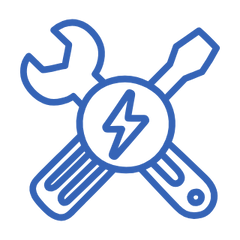
Boiler Maintenance & Healthy Pipework
A water softener can remove and prevent limescale. New softened water can gradually dissolve old scale in your pipes and boiler. Protecting them from limescale damage.
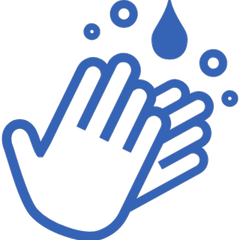
Natural Eczema & Dry Skin Treatment
Research shows a link between hard water and dry skin conditions like eczema. Softened water can naturally treat & soothe dry skin & eczema. It reacts positively with skin products to help dry skin & hair.
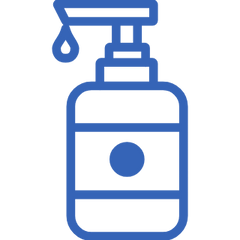
Less Time Cleaning & Less Products
Less limescale & scum means you won't need to clean as often or purchase expensive descalers. You’ll save time cleaning & money on shopping bills.
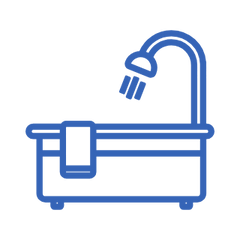
Better Water Flow & Protected Bathrooms
A water softener prevents blocked shower head and damage to fixtures and fittings such as your glass shower screen. Your bathroom will be protected and you'll notice a difference on taps and surfaces in the bathroom and kitchen.

Cheaper Energy Bills & Household Bills
Soft water requires less cleaning product and 50% less washing powder & toiletries - due to more lather. This cuts the cost of household shopping bills and you can strike expensive descaling products off your shopping list.
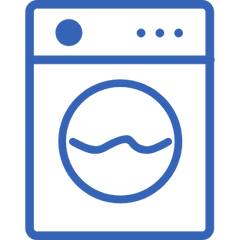
Longer Lasting Appliances
Hard water damages appliances such as washing machines & kettles. Soft water cuts the cost of appliance repairs and replacements caused by limescale and appliances like showers, washing machines, dishwashers last longer, work better & need fewer repairs.
Want to know more about water hardness and how a water softener can help?
Request more informationFrequently Asked Water Softener Questions
For questions on water softener issues or problems - please visit our full FAQs page click here.
Are there any downsides to water softeners?
A water softener can save costs on bills, while protecting your home from expensive damage. However, in order for a softener to work there are some running costs. These costs may be considered a ‘downside’.
However the cost of salt is affordable and in the soft water benefits and costs savings are worth the small maintenance.
Why does soft water feel different?
Sometimes people may experience and comment on the different feeling of soft water - describing it as silky or slippery feeling water. This is entirely normal and is explained by the health level of minerals vs the harder deposits of calcium and magnesium that are found in hard water.
How long does it take to remove pre existing scale when you start using softened water?
You will start to notice the softened water removing existing scale from your home within two weeks but the process can take some time to complete.
The time it takes to disappear completely depends on the level of limescale.
Typically, you can expect:
- In 6 weeks, scale will be gone from your kettle.
- In 6 months, scale will be gone from your hot water cylinder and boiler.
Can I use a water softener with my boiler if it has an aluminium heat exchanger?
Yes.
There is some dated and old misinformation regarding central heating and water softening.
But actually, a boiler that has an aluminium heat exchanger will perform better with softened water. Please see Beama list the HHIC position on their website.
Can I use softened water for mixing baby feeds?
No. While softened water is healthy and safe for most children and adults to consume, there’s an exception for babies being bottle or breast fed. Soft water has some extra sodium which is not recommended for small infants.
Not to worry, in this case, you may wish to have the kitchen sink isolated from the water softener, so you can easily use hard water dor drinking purposes.
Can I use softened water for the chilled water dispenser in my fridge?
Yes, you can plumb your softened water supply into the water chiller of your fridge. You may also prefer to keep your drinking water hard and as it is. In this case you can very easily have the kitchen tap isolated from the softener.
Can you use softened water in a dishwasher?
Yes softened water is great for all your home appliances such as the dish washer and also washing machine.
It can also save money. When you normally add salt to your dishwasher, the dishwasher uses it to create its own softened water supply. If you install a water softener, you won’t need to do this anymore because the water that comes into the machine is already softened!.

What is Hard Water and What are Hard Water Damages?
Hard water contains higher levels of magnesium & calcium minerals. The water hardness in your area, depends on the hardness by postcode. It is created when natural soft rainwater falls on porous rocks and ground.
Hard water will always cause damage - there is no escaping it, only living with it and paying the price as damage adds up over time.
- Lots of limescale – in your kettle, around your taps & fittings, on your shower head etc. It can cause damage to washing machines, dishwashers and cause corrosion, damage and make them less efficient.
- Limescale build up can occur inside your pipes. Meaning your heating and hot water system will be less efficient.
- The excess minerals in hard water can reside on your skin & react negatively with shampoos and shower gels - damaging the skin’s protective barriers, leading to dryness or skin conditions.
- Hard water doesn’t lather well, so you typically need to use more detergents, toiletries and cleaning products.

